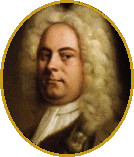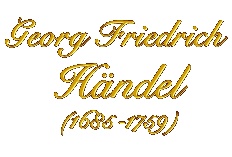

MIDI Files | Recommended Recordings | Books and Printed Music
Georg Friedrich Hдndel was born in Halle, Germany in 1685. His father, a barber-surgeon opposed music as his son's career though he permitted lessons from Zachau, composer and organist of Liebfrauenkirche, Halle.
Hдndel studied law at Halle University, turning to full-time musician when his father died. He went to Hamburg in 1703 where he joined the opera house under the composer Reinhard Keiser, playing 2nd. violin in the orchestra. His first opera Almira, written because Keiser lost interest in the libretto, which Hдndel took over, was pruduced there in 1705, followed by 3 others.
In 1706 Hдndel wen to Italy in a prince's retinue, meeting Corelli, the Scarlattis, and other leading figures, and rapidly attaining mastery of Italian style in opera, chamber and vocal music. He was acclaimed as a genius, the rival of his Italian contemporaries. His opera Rodrigo was performed in Florence in 1707 and Agrippina in Venice in 1709.
The following year he was appointed court conductor in Hanover, and was also invited to write an opera (Rinaldo) for London, where he quickly realized the possibilities for his own success, and after settling his affairs in Hanover settled there permanently.
For the next 35 years Hдndel was immersed in the ups and downs of operatic activity in London where the Italian opera seria was the dominant force.
In 1712 he received a pension of Ј200 a year for life from Queen Anne, this being increased to Ј600 by King George I, his former ruler in Hanover, for whom in 1717 he composed the famous Water Music suite.
From 1717 to 1720 Hдndel was resident composer to the Earl of Carnarvon (Duke of Chandos from 1919) at his palace of Cannons in Edgware. The 11 Chandos Anthems were the chief fruit of his appointment.
In 1719 Hдndel, in association with Boncini and Ariosti, was a musical director of the so-called Royal Academy of Music (not a college, but a business venture to produce Italian opera). Hдndel travelled abroad to engage singers and in the 8 years until the academy closed because of the lack of support, he composed 14 operas, among them Radamisto, Rodelinda, Admeto, and Tolomeo.
In 1727, for the coronation of George II, Hдndel wrote 4 anthems, including Zadok the Priest, which has been sung at every British coronation since then.The success of Gay's The Beggar's Opera and imitative works was the principal cause of the falling-away support for Hдndel's opera company. He went to Italy to hear operas by composers such as Porpora and Pergolesi and to engage the leading Italian singers. Back in London in partnership with Heidegger at the King's Theatre, Hдndel wrote Lotario (1729), Partenope (1730), and Orlando (1733). In 1734 he moved the new Covent Garden Theatre, for which he wrote two of his greatest operas, Ariodante and Alcina, but he realized, that the popularity of Italian opera was declining and began somewhat unwillingly, to develop the genre of dramatic oratorios which is perhaps his most original contribution to the art of music. Esther and Acis and Galathea, are typical examples. Ironically, released from the conventions of opera seria, Hдndel's dramatic gifts found wider and more expressive outlets in the oratorio form. Scores contain stage directions and the use of choir and orchestra became more dramatic and rich. He conducted several oratorio performances in London, 1735, playing his own organ concertos as entr'actes. Nevertheless he continued to write operas and between 1737 and 1740 composed Berenice, Serse, Imeneo and Deidamia.
In 1737 Hдndel's health cracked under his operatic labours and he had a stroke. Following his recovery, he wrote a series of oratorios, including Messiah, produced in Dublin, 1742. By this work his name is known throughout the world, yet it is something of an oddity in Hдndel's work, since he was not a religious composerin the accepted sense. But its power, lyricism, sincerity and profoundity make it one of the supreme musical creations as well as an outstanding example of devotional art. It was followed by Samson, Judas Maccabeus and Solomon. The success of these works made Hдndel the idol of the English, and that popularity dominated English music for nearly 150 years after his death. Not until Hдndel's operas were reviewed in Germany in the 1920's was the perspective corrected and the importance of that branch of his art restored. Superb as are Hдndel's instrumental compositions such as the concerti grossi, sonatas and suites, it is in the operas and oratorios that the nobility, expressiveness, invention and captivation of his art are found at their highest degree of development. He did not revolutionize operatic form, but he brought the novelty of his genious to the genre as he found it. The scene-painting and illustrative qualities of his orchestration are remarkable even at a period when naive and realistic effects were common currency.
For the last 7 years of his life Hдndel was blind, but he continued to conduct oratorioperformances and to revise his scores with assistance from his devoted friend John Christopher Smith. His works were published by the German Hдndel Gesellschaft in complete edition(1859-94) of 100 volumes edited by Chrysander, and a new edition, the Hallische Hдndel-Ausgabe is in progress.